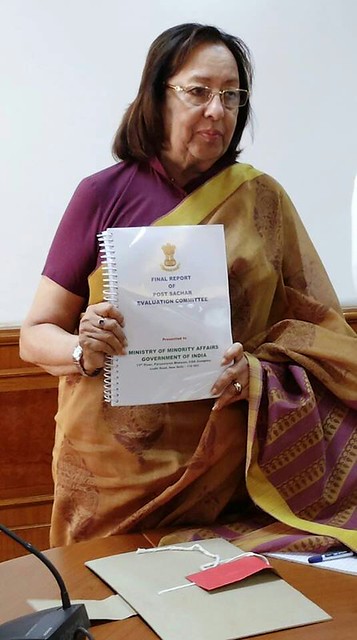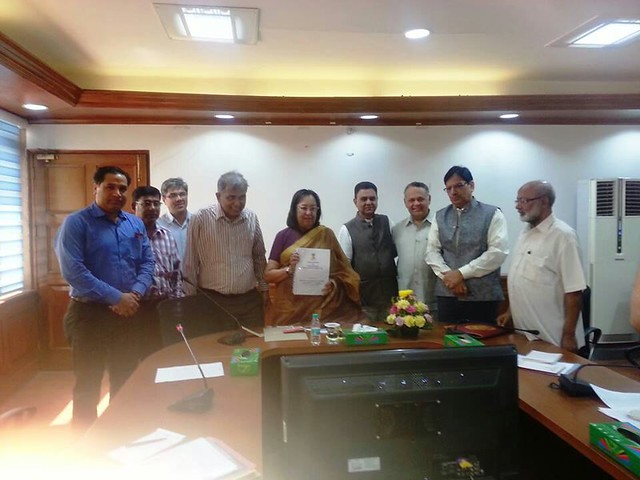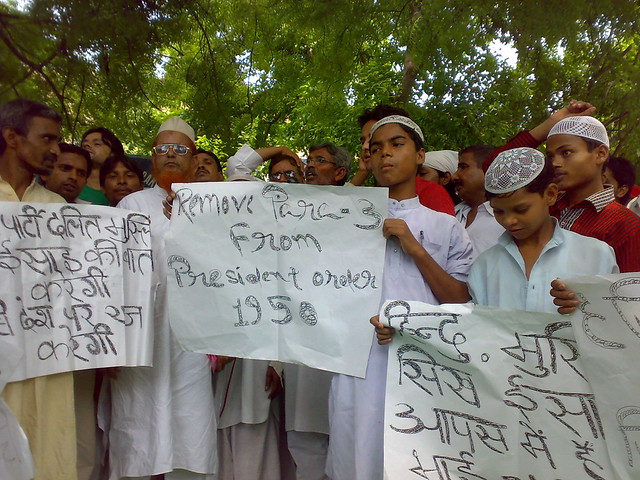By Nivedita Khandekar, TwoCircles.net,
New Delhi: The Post Sachar Evaluation Committee headed by Prof. Amitabh Kundu presented its final report to Dr. Najma A Heptulla, the Union Minister for Minorities Affairs on Thursday.
Earlier, among the important recommendations / observations of this Committee’s interim report – submitted in March 2014 – were inclusion of Muslim artisanal groups (referred to as ajlaf) as ‘Most Backward’ sub-category along with other similarly placed caste groups from other religions; inclusion of Muslims in SC category and carrying out surveys that cover the burden of acute and chronic diseases by “religion and other background characteristics.”

Dr. Najma A Heptulla
The Ministry of Minority Affairs had constituted this Committee under the chairmanship of Prof. Kundu of Jawaharlal Nehru University, New Delhi, and seven other eminent social scientists in September 2013. The mandate of the committee was to evaluate the process of implementation of Sachar Committee Report and the Prime Minister’s 15 points programme (for minorities). The committee was also asked to assess the outcome of the programmes implemented by Ministry of Minority Affairs and other Ministries and to recommend the corrective measures.
The members of this Committee visited some of the states with substantial Muslim population. The members interacted with NGOs, individuals and government departments associated with the task of implementing welfare schemes launched by the Centre to evaluate its functioning.
As per the interim report’s observation, the ST Hindus are at the bottom of the economic ladder in rural areas, followed by SC and then by Muslims, their ranking remaining unchanged over the past two decades and as also the period post adoption of SCR (socio-religious categories). The interim report (therefore) recommended that many of the Muslim artisanal groups (referred to as ajlaf by Sachar Committee) can be included in the ‘Most Backward’ sub-category along with other similarly placed caste groups from other religions.
It also recommended including Muslims in the SC category, making it legal in a manner similar to the SC/ST Prevention of Atrocity Act.
Observing that “the lower percentage of Muslim households participating in public employment programme, compared to Hindu or Christian households, suggests that any overt employment programmes are unlikely to address the problem of the Muslims – the most deprived minority in the labour market”, the Committee suggested increased participation in higher education and technical fields will help the Muslims to eventually move to better quality jobs.
“As regards the high unemployment among the youth especially among the rural females, it would be necessary to develop an environment that helps the unemployed Muslim youth relocate themselves from homes and take up the jobs in manufacturing and modern service sectors,” it said.

In the ‘health’ section, it had suggested that government surveys such as National Family Health Survey (NFHS) collecting data on health issues should collect and publish data by religion and other background characteristics. It further said, “Health surveys should cover the burden of acute and chronic diseases by religion and other background characteristics as against the current scenario where only maternal and child health indicators are considered” and added that all Muslim-concentration districts (MCDs) be made part of Annual Health Surveys (AHS) so that the impact of health and other schemes targeted at them can be tracked.
A very important observation was that the Muslims lag behind even the SCs in terms of access to amenities, and this problem needs to be addressed, irrespective of their better child health outcomes, due to community characteristics.
The overall literacy rate, school attendance rate and higher educational attainment rates are all very low among the Muslims, with never attended or currently not attending and dropout rate from education system being high, the report said and observed: “Muslim children generally drop out at a very young age, compared to the children from other SRC. At all the levels of education, OBC Muslims, however, are the most deprived group. Percentage of persons with vocational and technical training was also very low among them.

File photo
It also blamed non-availability of disaggregated data at the SRC and area levels for several schemes that makes assessment of the effectiveness of the schemes for different communities extremely difficult. “(As a consequence), it has not been possible to assess the benefits that have gone to different religious communities, and especially Muslims, barring the scholarships and Madarsa modernization schemes,” it said.
“Furthermore, due to lack of block level data, the investment meant for the minorities in MCDs has gone to non-minority concentrated blocks,” the report pointed out and welcomed the government effort at targeting minority concentrated blocks in recent years that will make the area based schemes more effective and meaningful to minorities.
A whole chapter in the interim report was devoted to Waqf properties’ management. The interim report had suggested that “waqf properties must be exempted from certain enactments to serve the greater philanthropic purposes of waqf properties through minor amendments.”
One of the important recommendations in this chapter dealt with the innumerable waqf properties, despite being a place of worship and of religious reverence, could not be touched by Waqf boards as these are declared as protected monuments under the control of the Archeological Survey of India (ASI). “These lists – of protected properties – must be annually reviewed and their conditions assessed in a joint meeting of senior officers of the ASI and the Central Waqf Council,” it had said.

Prof. Amitabh Kundu
The interim report also said the National Waqf Development Corporation Ltd (NAWADCO) can be given a boost by making its functioning Shariah compliant as a section of Muslims stay away from interest based projects and usurious transactions. “The corporation could work towards creating a level playing field with other Muslim welfare/affairs organisations such as the Tabung Haji of Malaysia. This would also attract investments from Muslims in large numbers strengthening the Corporation and extending larger welfare to greater number of people.”
As per mandate of the committee, it evaluated and assessed the implementation of the of the recommendations of the Sachar Committee and made suggestions for obtaining better outcome in its Final Report submitted to the Minister of Minority Affairs.
After submitting its interim report in March 2014, the Committee asked for an extension. The previous UPA government had given the extension and asked it to submit the report by September, 2014. The final report was submitted on Thursday.
“We are very happy with the very positive response from the Minister. She promised us proper implementation (of recommendations) as soon as possible,” Dr Kundu told TCN News.

